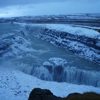It is no stretch to see alchemical symbolism in a drama
about chemistry. Beware: this includes spoilers about the ending of Breaking Bad.
When we first meet Walter White, he has lost his soul. His
genius, or daimon, has left him. Flashbacks later in the show reveal to us what
he was like when he was animated by his daimon -- brilliant, innovative,
destined to be a lord (of the corporation he co-founded). But Walter White,
high school chemistry teacher, is a man bereft of his animating genius, a shade
walking on earth. He discovers that his soul death is now becoming body death: cancer.
To reclaim his soul, Walt must journey to where his soul now
resides: the underworld. It is a place fraught with monsters (Tuco, Gus Fring,
sociopathic Todd). His daimon is now a demon -- in its exile, it has broken
bad.
Walt's journey involves him doing terrible things to reclaim
himself -- to feel alive again. He rationalizes all these actions, of course,
as being done "for his family" (the proper role of a genius in Rome
was as a guardian of the household and the family), but his daimon is in the
negredo stage of the alchemical Grand Opus, the blackened or putrified stage --
the "dark night of the soul". If he is to reclaim himself -- and his
namesake, the albedo or whitened stage of illumination -- he must journey
through Saturnine Night, the darkest, most despairing stage of the Opus.
His darkest moment comes when he claims a sacrifice: letting
Jane choke on her vomit. His decision point here was to either save her, and so
give up the Work and become ordinary Walter White, or let her die and give life
to Heisenberg, his dark daimon. He chooses his daimon. At the lowest point, when
everything is at its most dense, the horrible gravity of this deed reaches up
to the very sky to draw it down -- in pieces. Jane's father's airplane falls in
fragments down onto Walt's lawn, the spoils of his murder, a grand act of Separation
from whence Conjunction can begin.
His daimon reclaimed, Walt is ascendant. He destroys the
underworld monsters who bar his return (exposing Gus Fring to the Philosophers
Fire) and resumes his original destiny: the empire business.
But he cannot be both Walter White and Heisenberg. He splits
himself: he remains Walt while Heisenberg becomes legion -- Todd's gang of white supremacists, Walter White's shadow given form. Walt thinks
he's out, but his dark side is running the empire. Thus, it is really Walt himself
who slays his own kin (poor Hank) and enslaves Jesse.
Walt cannot live without his other half. Removed from it in
the cabin in New England, he begins to literally wither away. Thankfully, the
Charlie Rose interview with the Schwartzes reignites the fire and allows Walt
to finally realize what he must do: atone. His white jacket in the final
episode symbolizes not only his reclamation of his true name but his purity of
motive at the end. He makes things right -- as right as they can be made, at
least. He calls on his daimon's genius a final time to secure his family's
future (and also allowing the Schwartzes to atone for their former betrayal)
and builds a weapon that annihilates the monsters of his own making and frees
Jesse.
Jesse was also a part of Walt. Pinkman's release is the final rubedo (reddening) stage of the
Great Work. Walt is done.
His last act is to realize the Philosophers Stone, his
"special love", his "baby blue" meth. The blue sky of eternity.










No comments:
Post a Comment